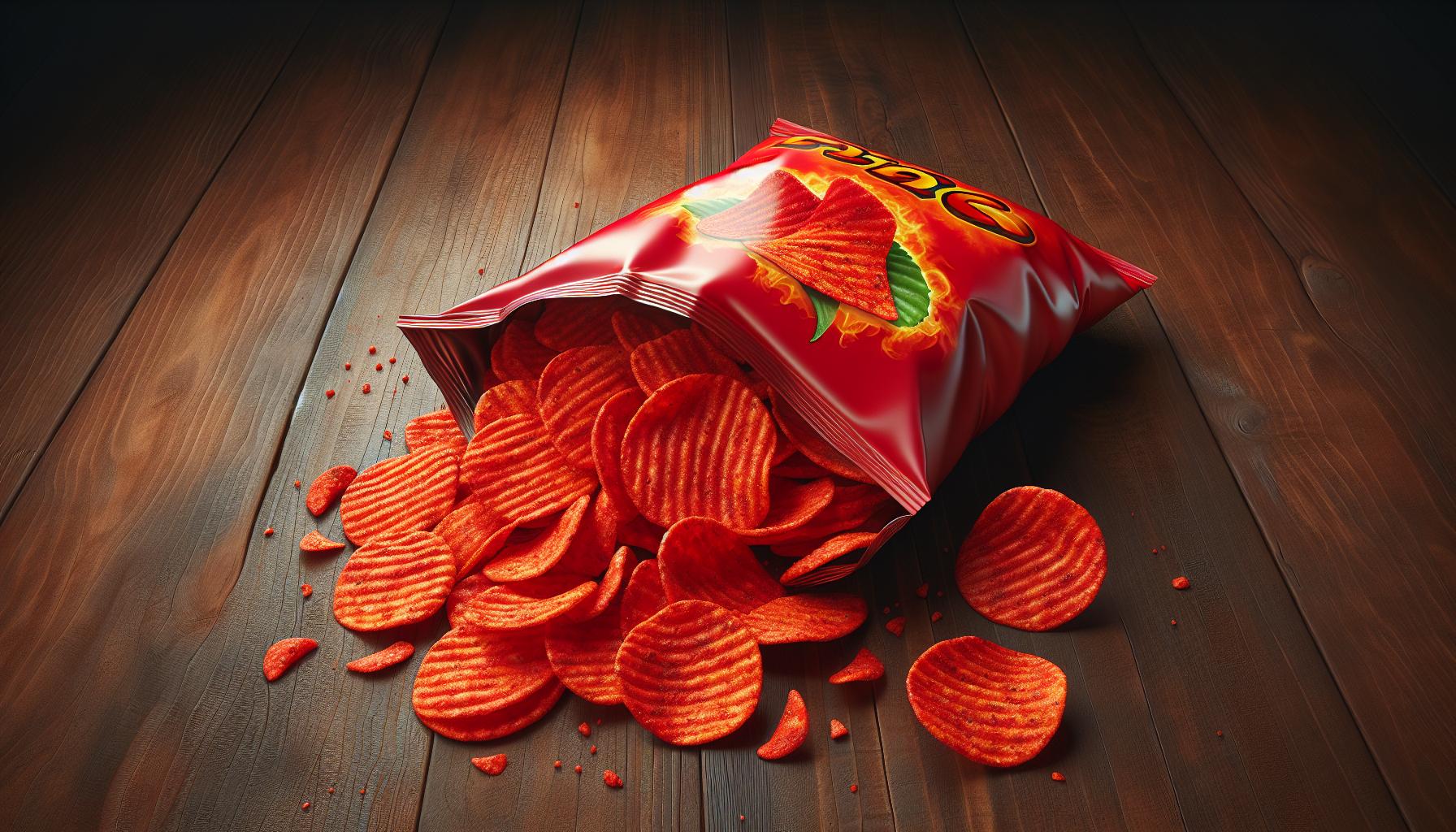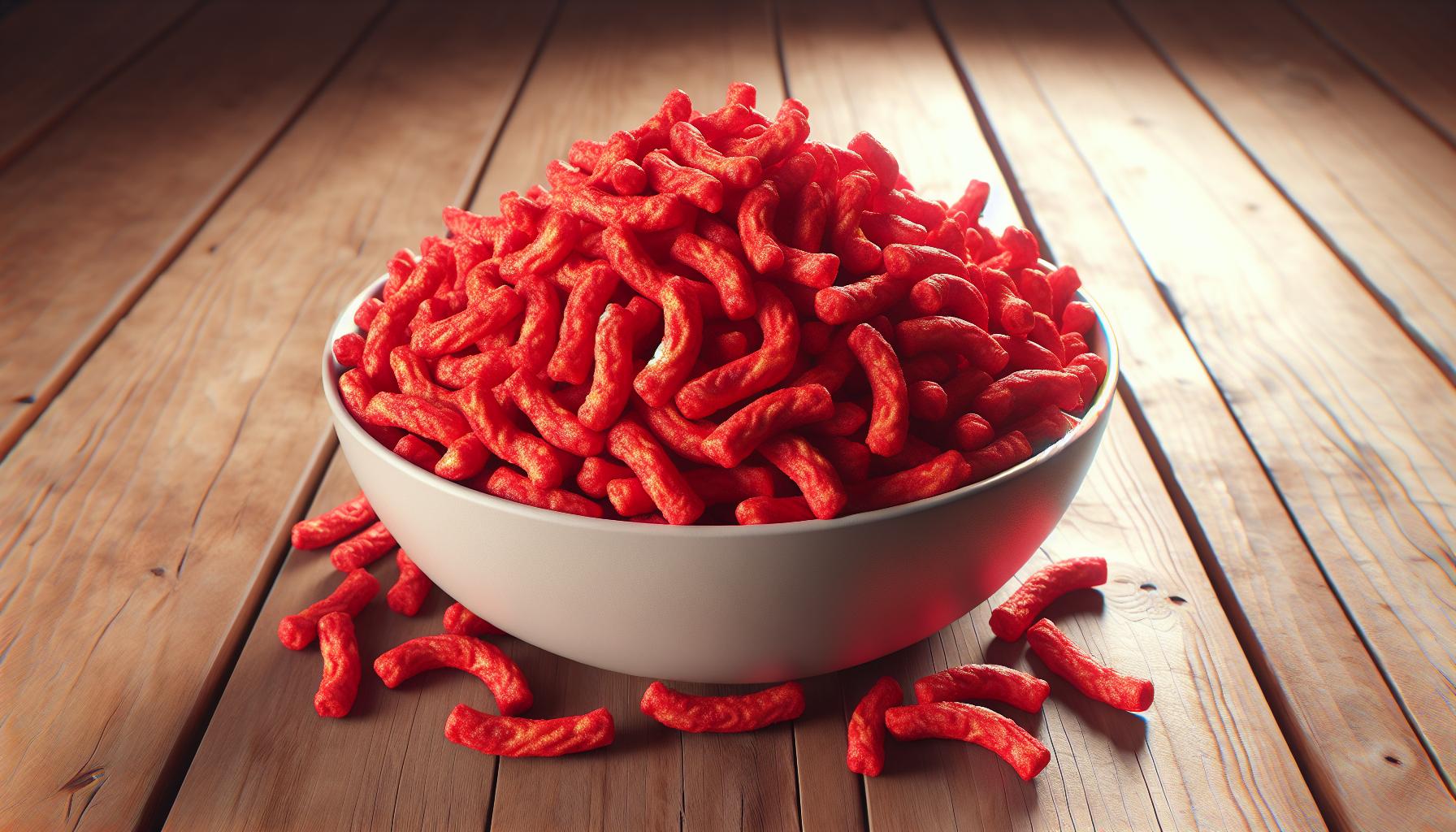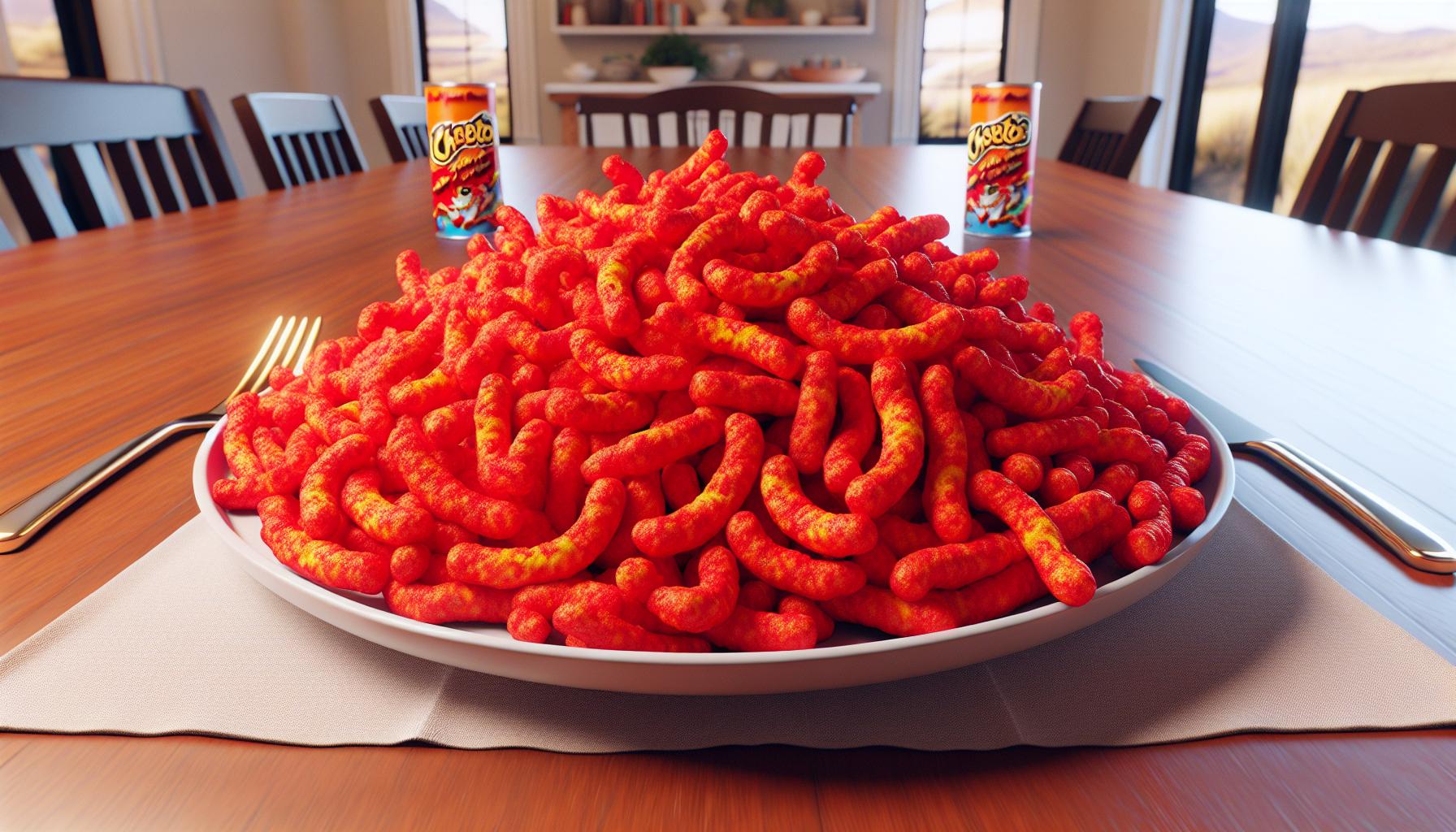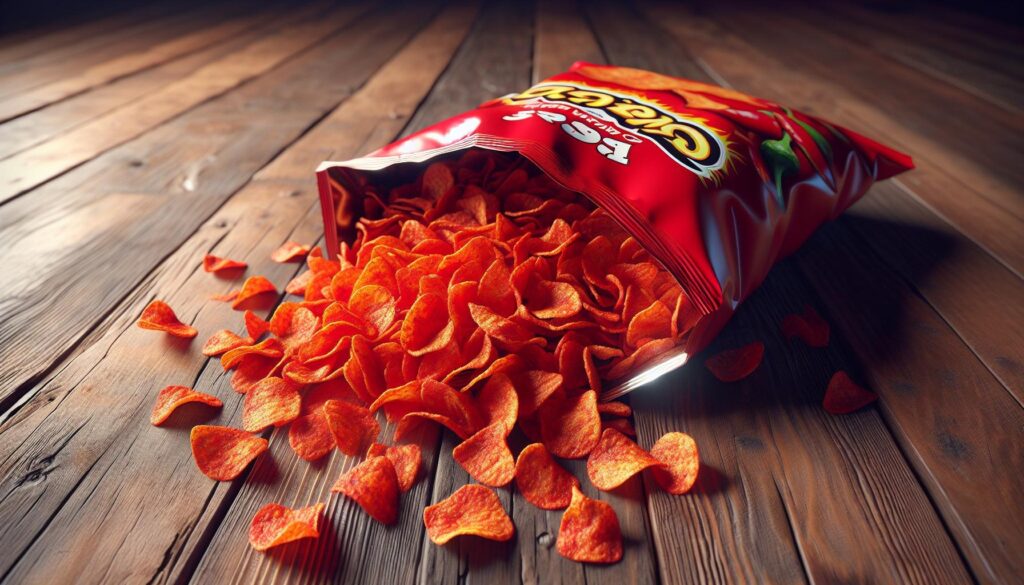That fiery red bag of Hot Cheetos beckons from the snack aisle promising an explosion of spicy flavor. But before diving into that crunchy guilty pleasure it’s worth taking a closer look at what’s really inside. The nutrition label tells an eye-opening story about this beloved snack that’s taken the world by storm.
From its modest beginnings as a janitor’s creative spark to becoming a billion-dollar phenomenon Hot Cheetos has transformed snack culture. Whether they’re appearing in viral TikTok recipes or causing playground controversies this spicy sensation comes with some surprising nutritional facts that might make snackers think twice before polishing off an entire bag.
Hot Cheetos Nutrition Label
Hot Cheetos contains several key ingredients listed prominently on the nutrition label. A single 1-ounce (28g) serving of Hot Cheetos delivers:
| Nutrient | Amount |
|---|---|
| Calories | 160 |
| Total Fat | 11g |
| Saturated Fat | 1.5g |
| Sodium | 250mg |
| Total Carbohydrates | 15g |
| Dietary Fiber | <1g |
| Protein | 2g |
The primary ingredients in Hot Cheetos include:
- Enriched corn meal as the base ingredient
- Vegetable oil (corn, canola, sunflower oil)
- Salt for flavor enhancement
- Artificial color (Red 40 Lake, Yellow 6 Lake)
- Monosodium glutamate (MSG) for flavor enhancement
Artificial additives in Hot Cheetos create the distinctive flavor profile:
- Citric acid provides tanginess
- Maltodextrin enhances texture
- Natural flavors blend with artificial flavors
- Spice extracts create the signature heat
Hidden components in the nutrition facts reveal:
- Trans fats appear as 0g due to rounding rules
- Sugar content stays under 1g per serving
- Sodium levels reach 10% of daily recommended intake
- Serving size equals approximately 21 pieces
The ingredient list displays items in descending order by weight, with enriched corn meal comprising the largest portion of the product. These components combine to create the characteristic crunch, heat sensation, and flavor intensity that defines Hot Cheetos.
Calorie and Macronutrient Content

Hot Cheetos’ nutrition label reveals specific caloric values and macronutrient ratios per serving. Understanding these components helps consumers track their nutritional intake effectively.
Total Calories and Serving Size
A single serving of Hot Cheetos contains 160 calories in a 1-ounce (28g) portion, equivalent to about 13 pieces. The serving size represents a standard snack portion, though many consumers eat multiple servings in one sitting. A full bag of Hot Cheetos (8.5 oz) contains approximately 1,360 calories spread across 8.5 servings.
| Serving Size | Calories |
|---|---|
| 1 oz (28g) | 160 |
| 8.5 oz bag | 1,360 |
Fat, Protein and Carbohydrate Breakdown
The macronutrient profile of Hot Cheetos includes 11g total fat, 15g carbohydrates, and 2g protein per serving. The fat content consists of saturated fat (1.5g), unsaturated fats, and trace amounts of trans fat. Carbohydrates include less than 1g of dietary fiber and 0g of added sugars.
| Macronutrient | Amount per Serving |
|---|---|
| Total Fat | 11g |
| Carbohydrates | 15g |
| Protein | 2g |
| Saturated Fat | 1.5g |
| Dietary Fiber | <1g |
Sodium and Mineral Content

Hot Cheetos contain significant amounts of sodium along with various minerals in their composition. The mineral profile reveals important considerations for daily nutritional intake monitoring.
High Sodium Concerns
A single 1-ounce serving of Hot Cheetos contains 250mg of sodium, representing 10% of the recommended daily intake. Regular consumption of multiple servings increases sodium intake substantially, with an 8.5-ounce bag containing 2,125mg of sodium. The sodium content comes from multiple ingredients including:
- Salt as a primary flavoring agent
- Monosodium glutamate for enhanced savory taste
- Sodium diacetate as a preservative
- Citric acid sodium salt for tartness
Other Mineral Values
The mineral content in Hot Cheetos includes trace amounts of essential nutrients. The snack provides:
| Mineral | Amount per 1oz serving |
|---|---|
| Iron | 0.4mg (2% DV) |
| Calcium | 20mg (2% DV) |
| Potassium | 60mg (2% DV) |
| Phosphorus | 30mg (2% DV) |
These mineral values derive from the enriched corn meal base combined with seasoning ingredients. The fortification process adds iron through ferrous sulfate treatment while calcium originates from dairy-based flavor components.
Artificial Colors and Flavorings

Hot Cheetos contain multiple artificial colors and flavor enhancers that create their distinctive appearance and taste. These synthetic additives contribute to the product’s intense red color and spicy flavor profile.
Red 40 Lake and Other Additives
Red 40 Lake serves as the primary artificial coloring agent in Hot Cheetos, creating the bright red appearance consumers associate with the snack. This synthetic dye belongs to the family of azo dyes derived from petroleum sources. FD&C Yellow 6 Lake combines with Red 40 Lake to enhance the vibrant orange-red hue. The coloring agents adhere to the corn-based snack through a process called laking, which binds the dyes to aluminum hydroxide for better coating stability. Research links these artificial colors to behavioral changes in sensitive individuals, particularly children.
Flavor Enhancers and Preservatives
Monosodium glutamate (MSG) functions as a key flavor enhancer in Hot Cheetos, intensifying the savory taste profile. The ingredient list includes citric acid for tartness control plus sodium diacetate to maintain product freshness. Maltodextrin acts as both a flavor carrier and texture modifier while artificial flavors create the signature spicy taste. These additives work together to produce consistent flavor profiles across production batches. Food manufacturers combine these preservatives to extend shelf life up to 9 months while maintaining the intended taste characteristics.
Health Impact and Dietary Considerations
Hot Cheetos consumption affects daily nutritional intake through high sodium content multiple servings throughout the day. Regular consumption influences dietary patterns caloric balance.
Impact on Daily Nutritional Intake
A single serving of Hot Cheetos (1 oz/28g) contributes 8% of daily total fat intake based on a 2,000-calorie diet. The sodium content reaches 10% of daily recommended limits per serving making multiple servings potentially exceed healthy intake levels. The artificial colors Red 40 Lake FD&C Yellow 6 Lake accumulate in the body with frequent consumption. Regular intake affects micronutrient balance due to minimal vitamin mineral content replacing more nutrient-dense food options.
| Nutrient | % Daily Value (1 oz serving) |
|---|---|
| Total Fat | 8% |
| Sodium | 10% |
| Carbohydrates | 5% |
| Protein | 4% |
Understanding Portion Control
The standard serving size of 1 ounce (28g) equals about 21 individual Hot Cheetos pieces. Most snack bags contain 3.5 oz (99g) or 8.5 oz (241g) resulting in 3-8 servings per package. Single-serving portions provide 160 calories while a full 8.5 oz bag contains 1,360 calories. Package markings indicate serving sizes through clear measurement guides marked on the bag. Tracking portions helps maintain balanced nutrition avoiding overconsumption of sodium fat calories.
| Package Size | Total Calories | Number of Servings |
|---|---|---|
| 1 oz (28g) | 160 | 1 |
| 3.5 oz (99g) | 560 | 3.5 |
| 8.5 oz (241g) | 1,360 | 8.5 |
Understanding the Hot Cheetos nutrition label reveals important insights for snack lovers. While this spicy treat delivers bold flavors that keep fans coming back the nutritional content deserves careful consideration. A single serving packs significant amounts of sodium and fat with minimal nutritional benefits.
Consumers can make informed decisions by reading the nutrition label and practicing portion control. Whether enjoying Hot Cheetos as an occasional treat or seeking healthier alternatives knowing what’s inside the bag empowers better snacking choices. The key lies in balancing enjoyment with nutritional awareness for optimal dietary habits.

